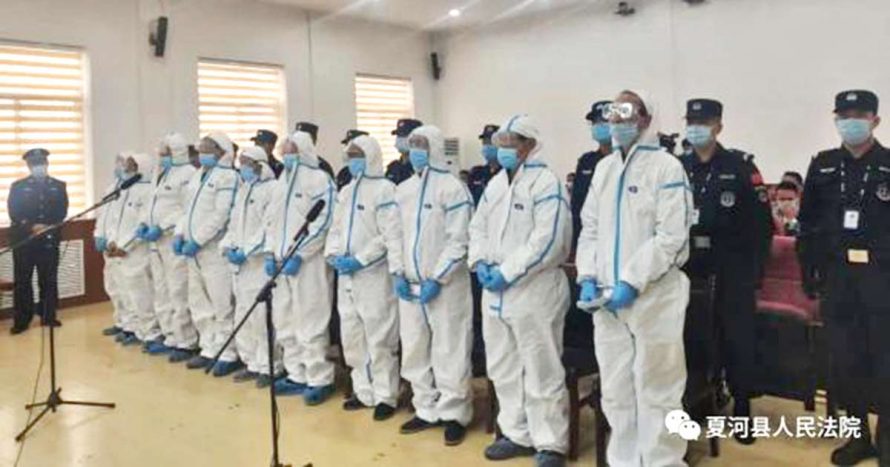
Ten Tibetans have received harsh prison sentences in a trial that reveals how China uses “anti-gang” measures to silence Tibetans and deny them fair trials, the International Campaign for Tibet finds in a new report.
“The ‘Evil’ Trial of 10 Sangchu Tibetans” report is available to download here.
To create the report, ICT analyzed a rare 10-hour video recording of a trial on June 28-29, 2020 in the Sangchu (Chinese: Xiahe) County People’s Court in Gansu province’s Kanlho (Gannan) Tibetan Autonomous Prefecture.
At the end of the trial, the judge gave 10 local Tibetans prison sentences of nine to 14 years for “extortion” and “forced trading.”
Chinese authorities are not known to hold such “open court sessions” in trials relating to Tibetans, let alone post them on the internet. There was a semblance of the court following due process by providing opportunity for defense counsels. However, the defenses offered by the Tibetans were disregarded despite their merits, and political punishment was rendered in the guise of due process.
The Tibetans faced prosecution under the “Saohei Chu-e” campaign, a three-year (2018-20) effort to eliminate “gangs” and “organized crime” in China, which annexed Tibet, a historically independent country, more than 60 years ago.
Throughout the trial, prosecutors and judges repeatedly referred to the Sangchu 10 as an “evil gang.”
ICT findings
In reality, the trial shows that the defendants, who are respected community leaders, were only requesting compensation for property damage from state highway projects; raising concerns about a slaughterhouse in their hometown; and fundraising and procuring a piece of abandoned land for the monastery’s use.
For example, Tibetans in Banggurthang township in Sangchu county were worried about the construction of a slaughterhouse in 2012. A prominent anti-slaughter campaign has been active in Tibet for the past 20 years.
Motivated by their Tibetan Buddhist beliefs, local Tibetans voiced their concerns to the slaughterhouse company. The company then agreed to provide 1 million yuan for a new Buddhist stupa to pacify the Tibetans.
Years later, however, Chinese authorities twisted the facts and described the $1 million yuan as “extortion” when they put the Sangchu 10 on trial.
Similarly, compensation local Tibetans received around 2013 for damage to their homes from the construction of the Lin-He expressway also was projected as evidence of extortion during the Sangchu 10 trial.
Analysis
According to ICT’s report, the case of the Sangchu 10 shows how the Chinese Communist Party perceives Tibetan grassroots folk leadership as corrosive to the party’s political power at the grassroots level.
The case also shows how the party cements its political power at the grassroots level through political-legal campaigns.
Chinese authorities view Tibetans’ community service through folk traditions—like the kind members of the Sangchu 10 took part in through a Monastery Folk Management Committee—as a form of “gang crime.”
Conclusions
During the trial, defense attorneys pointed out that the Sangchu 10 did not extort anyone. They also raised concerns about the years-long delay in charging the 10 Tibetans and other procedural flaws.
Some members of the Sangchu 10 also stated that they were illiterate and had little education or understanding of the law.
Their convictions add them to the list of Tibetans unjustly imprisoned under the Saohei Chu-e campaign.
Due to China’s lack of transparency—as well as its refusal to allow independent journalists and investigators into Tibet—it’s impossible to know exactly how many Tibetans have faced prosecution under the anti-gang campaign.
However, it’s believed that several hundred Tibetans have been imprisoned under the initiative.
ICT quote by President Matteo Mecacci
In its new report, ICT provides a gist in English of the Sangchu 10 court proceedings, as well as clips from the trial and links to the full video.
“The conviction of the Sangchu 10 exposes the flaws of China’s ‘anti-gang’ campaign and judicial system in Tibet, which unfairly targets Tibetans,” ICT President Matteo Mecacci said. “The people of Tibet are entitled to their fundamental rights, including when prosecuted, and the Chinese authorities should realize that by unjustly punishing Tibetans, they only aggravate the situation and increase the people’s mistrust in their rule.”